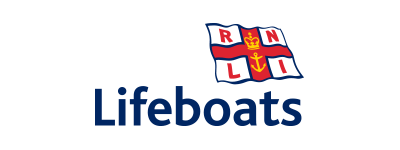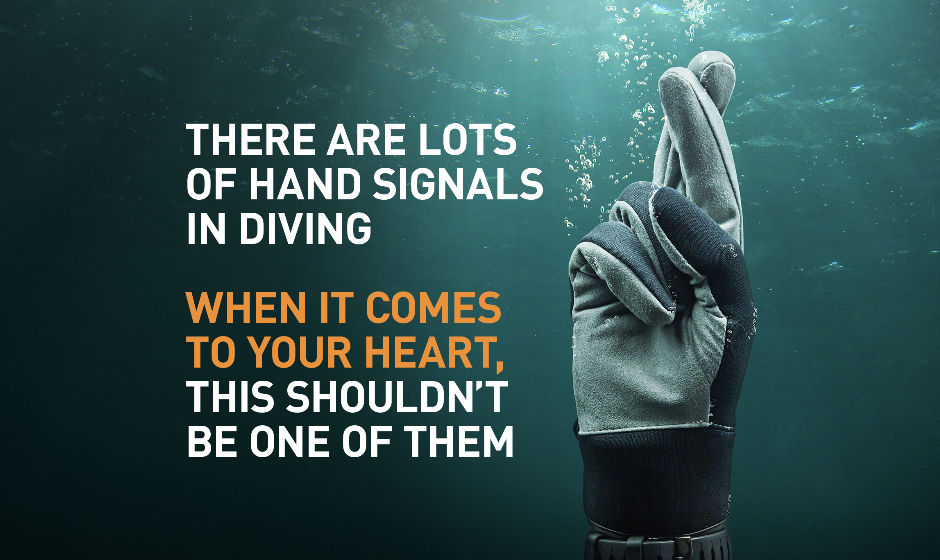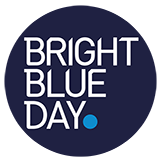
Vital signs

Communicating the need to
check your heart before diving
The RNLI wanted to remind experienced scuba divers – a group for which recklessness is already taboo – of the risks of diving without a healthy heart. Even if, on average, more people die each year in the bath than while scuba diving, the RNLI had identified that a simple health check prior to diving could save lives, since diving raises the blood pressure and can exacerbate existing heart conditions, with potentially fatal consequences.
Preaching to the converted
The challenge they brought to BBD seemed fairly straightforward – convince a group already accustomed to routine checks and safety procedures to undertake a single additional check.
The problem, however, was persuading divers to make the connection between diving safety (sacrosanct) and personal health (more subjective). In short, the campaign had to sneak in a last-minute change to the rules.
The RNLI had identified as its target group experienced male divers aged 45+, with the simple mission to get them to check the health of their heart, ideally at a WellPoint (the leading health kiosk in the UK) on site. If not, they should book a check-up with their GP before their next dive. Hit this target and the organisation would be on its way to meeting the over-arching goal to reduce coastal drowning by 50% by 2024.
An awkward conversation
How do you craft a safety message to grab the attention of a group that is already risk-averse, experienced, cautious and highly trained? From the middle aged club diver to time-served instructors, initial focus groups revealed that scuba divers already felt they knew what they were doing, or had to do, in the event of emergency and that their training and equipment checks gave them the invisible cloak of invincibility.
Harder still, how do you suggest the possibility to someone dedicated to a sport that a heart problem completely beyond their control might force them to give up immediately?
Introducing the Shock Matrix
Bright Blue Day started by holding a workshop to brainstorm approaches and tactics. We worked through a ‘Shock-matrix’ gauging the effectiveness of humorous, heart-wrenching, and downright gory approaches. Did it need the kind of ‘you can’t ignore this’ shockvertising that forces smokers to quit, a ‘think of the loved ones you leave behind’ approach, or a humorous ploy to lure them in? Behaviour change, after all, is the holy grail of marketing.
Gradually, BBD refined an approach that would stop male scuba divers in their tracks, without trying to shock them into action. Out went real case studies, and in came heroic ‘this could be you’ messaging.
The need to speak clearly underwater
Part of the research meant learning the language of diving, immersing ourselves in their world. Through this, we came back repeatedly to the idea that diving uses a lot of hand signals, by necessity. Conspicuously absent among them was ‘fingers crossed’, the last resort of the ill-prepared.
BBD’s creative approach juxtaposed the underwater hand signal lexicon that nurtures safety with the one signal divers wouldn’t accept, complemented by a takeaway book of hand signals used in the sport.
The assets to be created included WellPoint and ambient pieces for dive stores, directing divers to check their health in-store at WellPoint kiosks. In that way the goal of the campaign could be achieved without the momentum of the message being lost.
Speaking on behalf of the RNLI, Dan Proctor was generous in his praise:
“Working with Bright Blue Day and their incredibly talented team on this thought-provoking brief has been really enjoyable and rewarding,” he said. “We encountered lots of challenges when looking and considering different ideas / creatives but together we re-grouped and went on to produce an excellent piece of work that not only will make the sport safer but more enjoyable and hopefully contribute towards the RNLI’s aim to halve costal fatalities by 2024.”

Share
